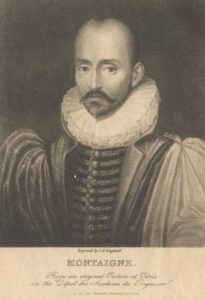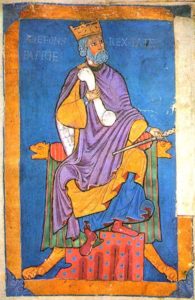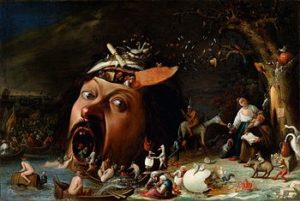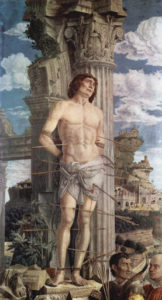‘What is Your Name?’: Nomenclature in The Tempest Part II
Richard Martin’s second instalment of lectures on names in The Tempest, see the first instalment, as he explores the nomenclature of Gonzalo, Alonso, Antonio and Sebastian as a supplement to his A-Level English Literature teaching.
Part II: Gonzalo, Alonso, Antonio and Sebastian
Gonzalo
Gonzalo is King Alonso’s counsellor and is described in the dramatis personae of the First Folio (1623) as ‘honest’. Though it was Ralph Crane who so describes Gonzalo as such, it is not an entirely inaccurate description of him. Antonio pays a backhand compliment to him in this respect when he insists that he must be killed alongside Alonso due to an integrity that would create problems for the co-conspirators. The other, time-serving courtiers will ‘take suggestion as a cat laps milk’ but Gonzalo is presented as unlikely to swallow the fictions they would be obliged to offer to explain the death of the King of Naples. Gonzalo’s cue to draw his sword is the result of the not very compelling claim that Antonio and Sebastian drew theirs because they heard ‘bulls’ (or was it?) ‘lions’.
Perhaps Gonzalo is not entirely stupid but that is what his name implies.
Gonzalo derives from Neapolitan slang for ‘stupid’ or ‘foolish’ and echoes the Spanish ganso meaning ‘idiot’ or ‘bumpkin’. ‘Bumpkin’ is surprisingly apposite given that Gonzalo lacks the sophistication and urbanity that might best suit his role and class. Gonzalo is instead remarkable ostensibly for his naivety. That naivety is first referenced in Antonio’s punning reference to Gonzalo having an ‘eye of green’. On the face of it, Antonio is commenting upon the relative paucity of greenery on an island burnt ‘tawny’ (in his view) by the heat of the sun, but it is also an allusion to, and anticipation of, the so-called ‘Commonwealth Speech’ in which Gonzalo envisages the recovery of the Golden Age and a return to Eden simultaneously. Gold and green are clearly Gonzalo’s favourite colours.
What we have learnt from Prospero about the skulduggery of events taking place 12 years ago, what we have grasped of Caliban’s treatment at the hands of Prospero and what we have heard from Antonio and Sebastian as an immediate prelude to Gonzalo’s utopic pipe-dream of a speech, convinces the audience of the idiocy, the folly of it. The folly of it is also clear from subsequent events in this very scene. Gonzalo’s dream of recovering Eden looks even more foolish in the light of the fratricide to which Antonio tempts Sebastian. Antonio’s temptation of Sebastian in a rural space irresistibly recalls the serpent’s temptation of Eve in the garden of Eden, leading to man’s ejection from this location, while fratricide is the first crime in the fallen world.
Thus Gonzalo’s fantasy of a return to a pre-lapsarian world looks particularly unworkable in retrospect.
There is no way back to the garden.
Ferdinand may speak of the paradisal nature of Prospero’s island (half way through the masque) but he has forgotten his treatment at the hands of Prospero and knows nothing of the latter’s treatment of Caliban.
G onzalo’s is a striking fictional figure because he has read a real book – Montaigne’s Essais (1580) and specifically the essay Of Cannibals but his folly resides in his failure to acknowledge that Montaigne makes no assumption that the quasi-paradisal life of natives is one to which the European can return.
onzalo’s is a striking fictional figure because he has read a real book – Montaigne’s Essais (1580) and specifically the essay Of Cannibals but his folly resides in his failure to acknowledge that Montaigne makes no assumption that the quasi-paradisal life of natives is one to which the European can return.
Compare Montaigne’s words:
I should tell Plato that it is a nation wherein there is no manner of traffic, no knowledge of letters, no science of numbers, no name of magistrate or political superiority; no use of service, riches or poverty, no contracts, no successions, no dividends, no properties, no employments, but those of leisure, no respect of kindred, but common, no clothing, no agriculture, no metal, no use of corn or wine; the very words that signify lying, treachery, dissimulation, avarice, envy, detraction, pardon, never heard of.
With Gonzalo’s:
Had I plantation of this isle, my lord…
And were the king on’t, what would I do?…
I’ the commonwealth I would by contraries Execute all things; for no kind of traffic Would I admit; no name of magistrate; Letters should not be known; riches, poverty, And use of service, none; contract, succession, Bourn, bound of land, tilth, vineyard, none; No use of metal, corn, or wine, or oil; No occupation; all men idle, all; And women too, but innocent and pure; No sovereignty;–
The unlearning implicit in Gonzalo’s scorched earth policy by which humanity in his utopia would give up the very alphabet that has enabled him to read, albeit to misunderstand Montaigne, is not a feature of the latter’s essay. Montaigne describes native culture but nowhere in the essay does he assume the possibility of its replication by Europeans.
Gonzalo’s fervent embrace of Montaigne’s thesis (such as he understands it) leads to a potentially lethal situation on the island when he counsels his king to eat the food that has mysteriously appeared before them, on the grounds that natives are far too decent to poison their guests. But imposing the template of Montaigne’s essay on a situation in which the food has been brought in by spirits (not ‘people of the island’ as confidently asserted by Gonzalo) is a foolish kind of counsel. These spirits, after all, work on behalf of a magician seeking vengeance on Gonzalo’s king, the latter’s brother and the duke of Milan.
Gonzalo is subtly drawn by Shakespeare and I have noted above a potential perceptiveness in him that might have led him to draw his sword, based on the assumption that the only ‘wild beasts’ on the island are the King of Naples younger brother and the current Duke of Milan. Yet an over-riding impression of Gonzalo’s idiocy remains. His identification of the gods as responsible for the union of Ferdinand and Miranda is one that an audience (who are privy to Prospero’s machinations during the course of the play) could not possibly accept) and his attempts to find harmonic symmetry in the idea of their journey as having had the celebration of one nuptial as its aim but happily involving them in a second, is risible:
‘O, rejoice Beyond a common joy, and set it down With gold on lasting pillars: In one voyage Did Claribel her husband find at Tunis, And Ferdinand, her brother, found a wife Where he himself was lost…’
The paralleling of the marriages of the King of Tunis to Claribel and Ferdinand to Miranda is deeply embarrassing since it threatens to identify both as arranged marriages contracted for political purposes by Machiavellian fathers. Were Gonzalo aware of this he might forfeit the implications inherent in his name, but with his characteristic optimism he seems to view the first union as ennobled by associations with the second, rather than the second union tainted by associations with the first.
Alonso
Alonso is the Spanish and Portuguese diminutive version of Alfonso, itself deriving from an old Germanic name ‘Adalfuns’ meaning ‘noble and ready’.
The two meanings of Alonso’s name are ultimately appropriate given that his readiness after the encounter with the Harpy (in fact Ariel in disguise) to acknowledge wrong-doing 12 years before in respect of Prospero differentiates him from his co-conspirators, Antonio and Sebastian.
Their response to the encounter with the harpy is a collective intention to destroy it. Alonso’s capacity for ‘alchemical’ transformation is not shared by his or Prospero’s younger brother.

Given that Alonso is a variant of Alfonso it is possible that Shakespeare was familiar with the reign of King Alfonso VI of Leon and Castile (born 1040, died 1109) whose expansionist policy matches Alonso’s. The latter speaks oddly at one point of the play of Ferdinand as the ‘heir of Naples and Milan’ when he contemplates what ‘strange fish’ might have feasted on his son. The reference to Ferdinand as heir of both the Kingdom of Naples and the duchy of Milan is rarely commented upon but it is either an error on Shakespeare’s part or evidence of Alonso’s territorialism and intention of absorbing Milan into Naples. Ironically this will be achieved not by Alonso but by Prospero whose intention to marry his daughter to the future king of Naples secures his descendants as members of the royal house of Naples – but at the probable cost of the absorption of Milan into Naples. Thus Alonso’s words are proleptic and describe an eventuality of which Prospero does not show himself aware: ‘Alas, poor Milan’ the attentive reader might find themselves thinking. They are of course the words of Prospero, lamenting the humiliation of his state by Antonio!
Notably, Alfonso was implicated in his brother, Sancho II’s death – a historical detail which Shakespeare – if he knew of this – reverses in relation to Alonso whose death is plotted by his brother Sebastian. Sibling rivalry is of course of the utmost importance in The Tempest given that Antonio’s conspiracy with Alonso and Sebastian has his brother Prospero as its focus. One other interesting parallel is the fact that the loss of son and heir Alonso assumes himself to have suffered was tragically the case: Alfonso’s son and heir, Sancho died in battle.
Shakespeare’s tragi-comedy offers here a happier alternative just as it does when Shakespeare re-arranges the tragic death of Dido by enabling the Dido and Aeneas figures of the play to return to Italy together. Alfonso’s daughter,
Uracca was named as Alfonso’s heir – an eventuality Antonio argues unlikely in Claribel’s case in the light of Alonso and Ferdinand’s death, due to Tunis and Naples being so far apart from one another. In fact, of course they are not since the wedding party has just left Tunis, undertaking a not especially lengthy journey back to the Italian mainland before an inconvenient storm forces an unscheduled stop on Prospero’s island.
An island that has occasionally been identified as having a real-life geographical counterpart in Lampedusa.
Antonio and Sebastian
The question for all those sensitive to nomenclature concerning Antonio and Sebastian is articulated by Cynthia Lewis in her study of Shakespeare’s ‘Antonios’. For Antonio, in particular is a popular name with Shakespeare and has associations in his plays with generosity. A consideration of Mark Antony in Antony and Cleopatra and Antonio in Twelfth Night suffices to convince us of this connotation to the name. It applies a little more problematically in the case of Antonio in The Merchant of Venice whose loaning of 3000 ducats to his friend Bassanio and subsequent willingness to suffer the death to which the removal of a pound of his flesh should lead to lengthier discussion than it can receive here. In Particular Saints (1997) Lewis poses the question in respect of Antonio and Sebastian:
‘why are they the direct antitheses of their saintly precursors?’

Antonio certainly seems precisely antithetical, for his saintly namesake (born 251, died 356) was subject to temptation in the Egyptian desert whereas Antonio tempts Sebastian with the prospect of the earthly glory he would accrue by killing his elder brother and becoming King of Naples. Saint Anthony the Great (as distinct from the later Saint Anthony of Padua) is considered the ‘father of monasticism’ due to his eremitical retreat from the world. However, in Shakespeare’s play Antonio’s machinations lead to exile from the world on his brother’s part and enable Antonio to become to achieve a worldly glory primogeniture has hitherto denied him. ‘This cell’s my court’, says Prospero to his brother with a mingled pride in his asceticism and a bitterness that asceticism was thrust upon him.
If Shakespeare was thinking of that other Saint Anthony (of Padua, 1195-1231) his status as the patron saint of lost things is apposite. Act V of the play sees Antonio reunited with the brother whom he had assumed well lost for the last 12 years.

Saint Sebastian (256-258) was originally a Roman soldier whose refusal to sacrifice to the Roman gods led to him being tied to a tree and shot full of arrows – a punishment he miraculously survived. Sebastian in Shakespeare’s play inverts this association with martyrdom by being at the very least tempted to assassinate his brother. Intriguingly, Saint Sebastian haled from Milan though it would have been that much better (for me at the very least) had he been born in Naples!
Antonio and Sebastian are thus good examples of the way writers may employ nomenclature ironically and to significant effect.
Saint Sebastian is a saint especially venerated in time of plague. Indeed, Mantegna is thought to have painted the above work in thanks for surviving an epidemic. This association of Sebastian with plague and its cure is of no significance to the play (that I can see) but of some relevance to all of us currently.

